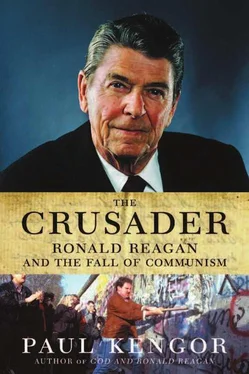MORALITY AND FOREIGN POLICY
While the 1970s saw Reagan starting to voice his many critiques of the United States’ Soviet policies, they also saw his fervent beliefs take on a new tone, one focused not just on the fall of Communism but on the moral imperative of the West to generate the collapse. This new voice spoke of the necessity of the demise of Communism, drawing a clear and unassailable connection between U.S. foreign policy and morality. 19To Reagan, accepting détente meant a rejection of a moral foreign policy, an idea which became a Reagan campaign theme for 1976. Richard Allen termed it Reagan’s “spring offensive” of 1976—an assault on the “intellectual and moral bankruptcy” of not only the USSR but current U.S. policy. 20
This morality dimension made Reagan’s foreign-policy preferences quite different from those of the previous hard-line anti-Communist Republican president, the realpolitik Richard Nixon, who felt that morality-driven foreign policy was nonsense. Nations are driven by interests, Nixon protested, not morality! “It’s ridiculous,” he growled, speaking of Reagan: “Foreign affairs aren’t about trust. They’re about interests and power.” He thought Reagan’s talk of morality and trust was “naïve.” 21
Despite Nixon’s critiques, Reagan had serious reservations with a Machiavellian foreign policy. For starters, he took exception with his friend over how Taiwan was treated once the United States began recognizing Red China. Reagan understood that a rapprochement with China would hurt Moscow and help Washington. In an August 1971 letter, he wrote: “Personally, I think the Red Chinese are a bunch of murdering bums. I think the President probably believes the same; but in the big chess game going on, where Russia is still head man on the other side, we need a little elbow room.” 22Hence, he supported Nixon’s shift toward China, keeping in mind, as he told fellow conservative M. Stanton Evans, that “Russia is still enemy number one.” 23
But though Reagan recognized the immense strategic value in a closer U.S. relationship with Communist China, he was highly sensitive not to “sell out” Taiwan in the process. When it appeared America had sold out its loyal ally, Reagan was furious, believing that the United States had not acted properly toward Taiwan. Later, when Taiwan was ousted from the United Nations, Governor Reagan wrote to President and Madame Chiang Kai-Shek, whom the Reagans had earlier visited on a mission for President Nixon: “Mrs. Reagan and I want you to know how deeply shocked and disappointed we were by the completely immoral action of the U.N. General Assembly.” 24
Reagan applied that moral sense to the Cold War. He said in a campaign speech that he wanted to “exert America’s moral leadership in the world again.” 25This meant he could not accept any theory or policy that accepted the status quo for Eastern Europe.
He found people in Moscow who agreed: Speaking of the Brezhnev doctrine, which called for Soviet support of Communist guerrilla forces throughout the Third World, Genrikh Trofimenko, the well-known director of the prestigious Institute for U.S.A. and Canada Studies of the Russian Academy of Sciences, said that the Soviet government’s opinion in the 1970s was that “there could not be a peaceful coexistence between wicked warmongering imperialists [America] and honorable and peace-loving Communists caring for the well-being of all progressive humanity.” This, he said, was the view elucidated by Comrade Brezhnev. To his credit, said Trofimenko, Reagan realized this, recognizing détente and peaceful coexistence for the “shams” they were. 26
Further vindicating Reagan’s allegations were the Soviets themselves, who made it clear that détente did not mean an end to their support of Communist insurgencies. In a January 16, 1976 article in the Washington Post, Peter Osnos reported: “Soviet commentators have been saying almost daily that the ‘policy of relaxation of tensions [détente] between states with different social systems [US and USSR] cannot be interpreted as a ban on the national liberation struggle of peoples who come out against colonial oppression or as a ban on class struggle.’” 27
Brezhnev himself said as much. In his address to the twenty-fifth Congress of the Soviet Communist Party in Moscow, he stated candidly: “We make no secret of the fact that we see détente as the way to create more favorable conditions for peaceful socialist and communist construction.” Détente enabled the Brezhnev doctrine in supporting Communist ideology and assisting “national liberation movements” around the globe. 28
Less openly, in a secret speech in 1973, Brezhnev had told fellow Communist leaders in Prague: “We are achieving with détente what our predecessors have been unable to achieve using the mailed fist. We have been able to accomplish more in a short time with détente than was done for years pursuing a confrontation policy….Trust us comrades, for by 1985, as a consequence of what we are now achieving with détente, we will have achieved most of our objectives.” Brezhnev’s brash declaration was downplayed by most of the major media when it became public four years later. When Reagan learned about it, he devoted a number of his syndicated daily radio commentaries to the speech, alleging that it “should have been front page in every major paper in the land.” 29
In fact, the USSR heartily supported Communist forces that opposed democracy and basic human and property rights. Under détente in the latter 1970s, the Soviets added, according to slightly varying accounts, ten or eleven nations to their list of client states. 30Such gains alarmed many in the West who did not expect détente to produce such results, and the policy at last began to fall into wide disfavor.
THE 1976 PRESIDENTIAL BID
As the bicentennial of America’s independence approached, Reagan had enough of those who robbed independence. He decided to seek the seemingly impossible: to challenge the incumbent president’s bid for reelection, an incumbent from his own party. During his vocal anti-Communist campaign in the 1970s, Reagan had attacked not just détente, but also the Republican administration of Gerald R. Ford that favored the policy. 31While on the campaign trail, Reagan did not hesitate to reiterate his sharp critiques of Ford policy. To cite one, in an October 1975 radio broadcast, he wrote, “We are blind to reality if we refuse to recognize that détente’s usefulness to the Soviets is only as a cover for their traditional and basic strategy for aggression. Détente is for the Soviet Union a no-can-lose proposition.” 32
In addition, Reagan opposed Ford’s signing of the Helsinki Accords in August 1975, a product of détente which he perceived as a human-rights farce. It was nothing more than a “propaganda plus” for the Kremlin, Reagan wrote in a February 1976 op-ed for The Wall Street Journal. By signing the accord, the United States had, in effect, “agreed to legitimize the boundaries of Eastern Europe, legally acquiescing in the loss of freedom of millions of Eastern Europeans.” Worse, said Reagan, Helsinki did nothing to constrain the Soviets outside of Eastern Europe. “After Helsinki,” wrote Reagan correctly, “the Soviet Union quickly made it clear that the so-called ‘wars of national liberation’ of which they are so fond, would not be affected by the document.” 33For Reagan, Helsinki was a bitter example of how détente only resulted in further Soviet legitimization and strength. Like détente itself, Helsinki was contemptible.
Throughout the campaign, Reagan hit détente so hard that there was a consensus that President Ford stopped using the term because Reagan had made it a dirty word. 34New York Times columnist Anthony Lewis said Ford not only dropped the word from his vocabulary but fully abandoned it in his foreign policy, and, worse in Lewis’ judgment, Ford was beginning to sound like Reagan—“more hysterical, more xenophobic.” 35Similarly, Jon Nordheimer of the New York Times reported that Reagan was attempting to place an “indelible stain” on the policy of détente “as exercised” by Ford and his Secretary of State Henry Kissinger. 36So successful was Reagan that the Times, in a May 14, 1976 editorial titled “Mr. Reagan’s Veto,” claimed that the former governor had “won something approaching veto power over the Ford Administration’s foreign policy.” 37In another editorial, titled, “President Under Seige,” the Times opined: “Governor Reagan has become a credible candidate while President Ford has slipped from almost certain victor to underdog.” 38Reagan was making a dent.
Читать дальше












